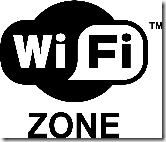 Whether you’re heading home for the holidays or simply escaping to a warmer clime for a little sunshine, you’ll probably want to stay connected while you’re traveling from point A to point B. Public wi-fi access is everywhere—in cafes and even in the friendly skies. Here are some tips to protect your online security when you use public wi-fi.
Whether you’re heading home for the holidays or simply escaping to a warmer clime for a little sunshine, you’ll probably want to stay connected while you’re traveling from point A to point B. Public wi-fi access is everywhere—in cafes and even in the friendly skies. Here are some tips to protect your online security when you use public wi-fi.
A public hotspot is a wireless network set up for shared Internet access. The hotspot host buys a wireless access point, connects that device to the Internet, and broadcasts its signal within a public place. Anyone with a wireless card within range of the host’s access point can access its network and use the Internet.
Most proprietors make it quick and easy for customers to use their hotspots. But by minimizing login requirements and avoiding encryption compatibility issues, they disable much of the security built into the wireless device. This is a notable tradeoff. Without encryption, your plain text data passes unprotected through the air as radio signals. Those signals can be intercepted by anyone with a receiver and some basic, widely available tools. When the hotspot you’re on doesn’t use encryption, someone who intercepts your data can read whatever you’ve sent–whether it’s a private email or a user name and password combination.
Beware of Cybercriminals
Although it’s unlikely that nosy hotspot neighbors will put your privacy at risk, you should be on the alert for the most serious hotspot danger: a cybercriminal. These technically savvy hackers have the tools, skills, and patience to work around the limited protection measures some hotspot hosts take.
For example, some cybercriminals have learned to use social engineering methods to con hotspot users into divulging sensitive information. By wi-phishing, a cybercriminal can pre-empt a hotspot’s wireless signal with one of his own, spoof the legitimate network name, and replace the sign-up page with a look-alike. You’ll end up supplying your information to this evil twin, not the hotspot provider. Once you’re on the spoofed hotspot, you may be redirected to other fraudulent or virus-laden Web sites, or even be tricked into setting up a “new account” and providing credit card numbers or other identifying information.
Tips to Keep Yourself Safe at Public Hotspots
With these security dangers lurking, protecting yourself at public hotspots becomes your own responsibility. Here are some things you can do to keep yourself safe:
- Be aware of your surroundings. Make sure no one is peering over your shoulder when you log into your operating system, email, IM, or other accounts.
- Never leave your laptop or handheld device unattended—not even for a moment.
- Don’t allow your wireless card to automatically join the nearest network. Instead, manually select the hotspot when you connect.
- Make sure you’re on a legitimate hotspot by checking with the host to confirm the network name and connection process.
- Turn off file sharing when you’re using a hotspot, and try to minimize the amount of sensitive, personal data you store on your laptops and mobile devices. You can usually turn off file sharing from your operating system’s network settings menu.
- Don’t do your online banking or trading at a public hotspot. Save it for a more safe and controlled environment.
- Limit email and IM to casual communications. If you use IM or email at hotspots, never send anything that should not be made public. Consider setting up an extra Web-based email account to use at hotspots.
- Don’t surf Web sites you wouldn’t want a stranger to know you’re viewing.
- Turn off your wireless card when you’re not using it.
- When you’re on a public hotspot, you have no idea what infections other connected computers might have, or whether there may be a hacker prowling the network. Norton Antivirus or Norton Internet Security–both from Symantec–protect you from viruses, worms, Trojan horses, and dangerous intruders.
- Make wise computing decisions. Always avoid using hotspots for important communications or transactions.
Conclusion
Public wi-fi hotspots can be both friend and foe during your travels, unless you take precautions. It’s up to you to protect your computer, your data, and your privacy with good tools and cautious computing habits. We hope the tips we offered in this article help you to do just that.
Story source: Norton article library























Leave a Comment